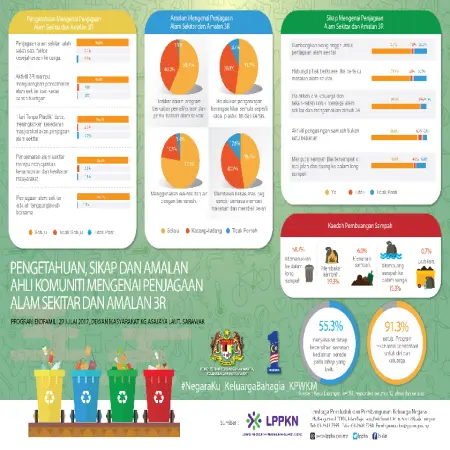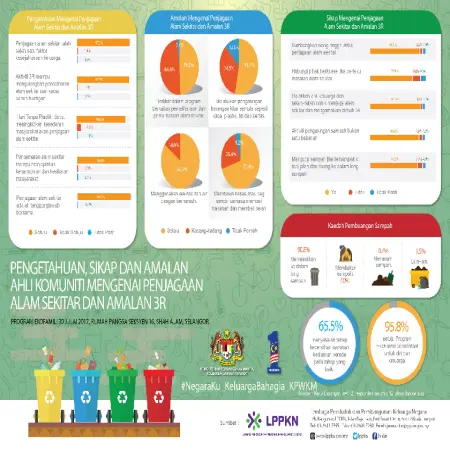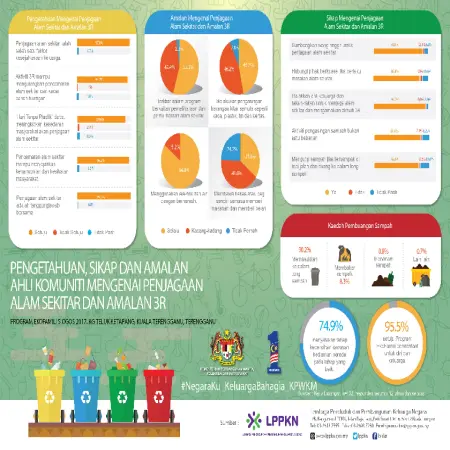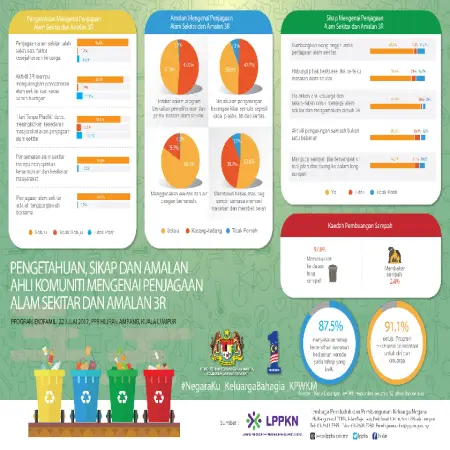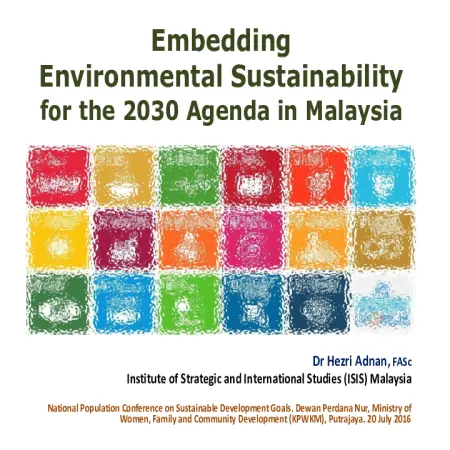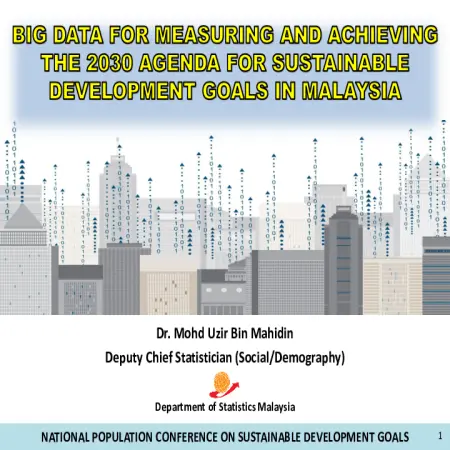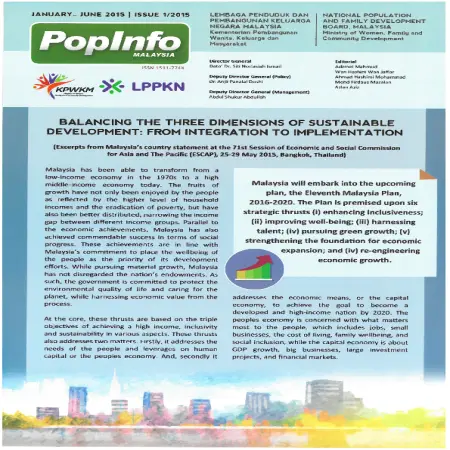TOPICS
Results for Topics : "Environmental Care"
|
|
Pengetahuan, sikap dan amalan ahli komuniti mengenai penjagaan alam sekitar dan amalan 3R di Sarawak
Item Type: Infographic
Editor:
Year: 00/00/2017
Abstract: Findings of the opinion survey knowledge, attitudes and practices of community members on environmental care and 3R practices during eco family -programs in Sarawak
|
|
|
|
|
|
Pengetahuan,sikap dan amalan ahli komuniti mengenai penjagaan alam sekitar dan amalan 3R di Selangor
Item Type: Infographic
Editor:
Year: 00/00/2017
Abstract: Findings of the opinion survey knowledge, attitudes and practices of community members on environmental care and 3R practices during eco family -programs in Selangor
|
|
|
|
|
|
Pengetahuan, sikap dan amalan ahli komuniti mengenai penjagaan alam sekitar dan amalan 3R di Terengganu
Item Type: Infographic
Editor:
Year: 00/00/2017
Abstract: Findings of the opinion survey knowledge, attitudes and practices of community members on environmental care and 3R practices during eco family -programs in Terengganu
|
|
|
|
|
|
Pengetahuan, sikap dan amalan ahli komuniti mengenai penjagaan alam sekitar dan amalan 3R di Kuala Lumpur
Item Type: Infographic
Editor:
Year: 00/00/2017
Abstract: Findings of the opinion survey knowledge, attitudes and practices of community members on environmental care and 3R practices during eco family -programs in Kuala Lumpur
|
|
|
|
|
|
Embedding the environment sustainability for the 2030 agenda in Malaysia
Item Type: Conference or Workshop Item
Editor:
Year: 00/00/2016
Abstract: The presentation will outline the rationale and overarching vision for embedding the environment in the SDGs. These are guided by four interlocking ideas: the environment is a prerequisite for socio-economic development; human health and wellbeing depends on good environmental quality; environment has intrinsic values; and finally, protecting the environment can be a new source of economic growth.
|
|
|
|
|
|
Big data for measuring and achieving the 2030 agenda for sustainable development goals in Malaysia
Item Type: Conference or Workshop Item
Editor:
Year: 00/00/2016
Abstract: The Sustainable Development Goals (SDGs) have set 17 goals and 169 related targets to be achieved by 2030. In line to support SDGs indicators, Big Data plays a pivotal role to achieve the aspiration by providing real time information and evidence-based decision making through the predictive analytics. Thus, Big Data Analytics (BDA) has become a top priority for Malaysia’s government and one of the key pillars for national ICT development under the 11th Malaysia Plan. In becoming a leading statistical agency internationally by 2020, DOSM has taken efforts to utilise big data to improvise outcome and produce a more comprehensive and quality services. DOSM is vital to ensure the statistical products and services are able to fulfil users’ expectations. In tandem with DOSM's Transformation Plan 2015-2020 and aiming to make the most of the fast-growing volume of digital data, DOSM has initiated the implementation of Big Data Analytics under the project of StatsBDA. This presentation aims to highlight DOSM’s experiences in constructing official statistics by using big data which is aligned to the 2030 Agenda for SDGs. In addition, we will also share on the issues and challenges faced by DOSM pertinent to utilising the Big Data.
|
|
|
|
|
|
Living the 'reduce, reuse and recycle' lifestyle
Item Type: Conference or Workshop Item
Editor:
Year: 00/00/2016
Abstract: In this presentation, the author will emphasise the urgency for "living the ‘reduce, reuse & recycle’ lifestyle” because humanity is living well beyond the ecological limits of one planet. Based on ecological footprint analysis, a tool for measuring sustainability, the biocapacity for humanity to be sustainable in 2012 was 1.7 global hectares (gha) per person (Global Footprint Network 2016; EF&B in 2012). Yet, the actual footprint of 2.8gha per person in that year globally indicates we were consuming the resources of 1 ½ planets. When we note further that some countries only survived on the equivalent of 0.7gha per person while others consumed the resources of over four planets at more than 8gha per person, it highlights the inequity of consumption across the human population. If this trend continues without shifting to a ‘reduce, reduce, reduce’ lifestyle, we will not achieve the sustainable development goals or Agenda 2030. Further, we will be borrowing from the future generations and compromising on their ability to meet their own needs. With a footprint of 3.7gha per person, Malaysians are already consuming the resources of more than two planets. Next, consumption patterns in 550 urban households in Malaysia based on data from an EPSM survey will be presented. In order to make the sustainable shift to ‘reduce, reuse & recycle’ lifestyle, an institutional framework needs to be created to mainstream sustainable development, as advocated by EPSM’s ongoing Sustainable Living in Malaysia (SLiM) campaign. Serious efforts need to be made to reduce our consumption of energy (electricity and fuel), water, meat and waste generation, including unnecessary shopping. In conclusion, the author will highlight examples of living the ‘reduce, reuse and recycle’ lifestyles.
|
|
|
|
|
|
Balancing the three dimensions of sustainable development: from integration to implementation
Item Type: Newsletter
Editor:
Year: 00/00/2015
Abstract: Malaysia has been able to transform from a low-income economy in the 1970s to a high middle-income economy today. Parallel to the economic achievement, Malaysia has also achieved commendable success in terms of social progress. These achievements are in line with Malaysia’s commitment to place the wellbeing of the people as the priority of its development efforts. As such, the government is committed to protect the environmental quality of life and caring for the planet, while harnessing economic value from the process.
|
|
|
|





